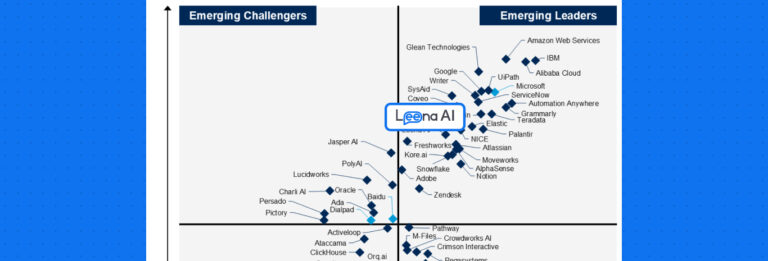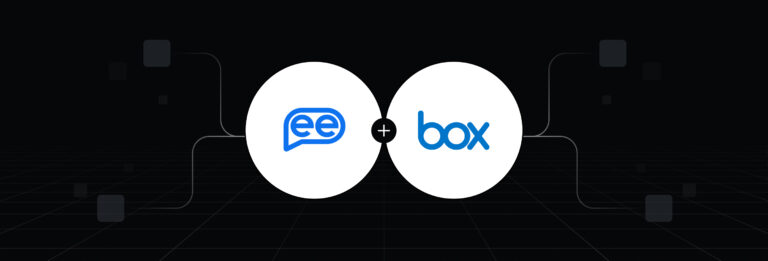Integrating technology to improve organizational processes is becoming a common practice these days; knowledge management systems (KMS) are no exception. KMS plays a pivotal role in helping the HR department address common queries of employees and provide information about business processes and policies.
However, today knowledge management systems are not limited to documenting process-related information in a dashboard. They have become increasingly vital for enabling employee engagement through adaptive learning and easy discovery. This is where AI in knowledge management comes into play.
It helps identify the most relevant content and people of expertise, analyze data to curate strategic learning programs at scale, and enable organizations to implement processes smoothly.
If you are wondering what else AI does to help HRs manage knowledge, you are at the right place. Read this blog to find out.
What role does AI play in knowledge management?

AI helps HRs in multiple ways. Here are some of its key functionalities that make it a must-have for knowledge management:
Content creation
Businesses are now using content as one of the primary strategies to disseminate organization and employee-related information to the workforce. HRs can use a knowledge management system to document job roles, courses and training, and business processes, such as onboarding, offboarding, and many more.
Integrating AI in knowledge management can take content creation up several notches by automating mundane, repetitive tasks involved in content generation, such as content discovery, curation, and publishing. An AI-powered knowledge management system can correct typos and also offer suggestions to improve content readability based on semantic rules.
With AI and machine learning in the KMS, businesses can serve employees personalized content and improve their experience with each interaction and iteration. AI tracks and charts every click and interaction with the content and collects insights that help optimize it to meet its purpose.
Knowledge discovery
With time, the knowledge base of an organization grows. If your employees struggle to access relevant information from the knowledge base via the KMS system, there is certainly something wrong with the search functionality of the KMS.
AI in knowledge management uses graph-based algorithms, coupled with natural language processing (NLP), to make relevant content reachable to employees based on keywords. The artificial intelligence-driven KMS understands employees’ intent to deliver what they want at their fingertips.
Moreover, the advanced text analytics automatically generates relevant tags for each content piece in the knowledge management system. This triggers the AI-based virtual assistant to show the relevant content according to those tags. It enables employees to find the correct information at the right time, and helps them boost productivity and experience better employee engagement despite an increasing knowledge base.
Another perk of utilizing AI for knowledge management systems is that it helps identify content gaps and maintain agility and continuity in business. The HR department can refer to the analytics and reporting dashboard to seamlessly address the knowledge gaps by updating the information.
Team collaboration
Companies, globally, have found that integrating AI in knowledge management systems brings wider and more successful adoption of the KMS, improved collaboration, and overall knowledge consumption value.
AI-powered virtual assistants fetch data from different sources to ensure employees do not have to navigate multiple applications to consume information. The virtual assistant consolidates and provides access to all the content and knowledge resources, spanning repositories across departments.
Employees can converse with the virtual assistant 24*7 and promptly get accurate answers to their queries. The on-point and meaningful conversations save time and boost employees’ experience.
Moreover, AI-powered systems continue to evolve and become even more intelligent as they learn from experiences.
Augment learning
Leveraging AI for knowledge management ascertains that every employee has access to organization-related information that may help them gain a competitive advantage against business competitors.
The AI-based knowledge management system applies analytics to gauge skill gaps within the organization and compare the data with the vital skills required to sustain in the workplace.
The virtual assistant examines the current expertise of each of the employees by assessing the type of content they consume or contribute to. It then alerts and nudges employees into acquiring new skills based on their talents and inclination. Not only does it help in skill enhancement but also enhances engagement and satisfaction rates, improving the overall retention rate.
AI-powered knowledge management systems harness the power of data processing by integrating the different organizational systems to help employees update their skillset.
Let’s assume a particular employee is consuming a significant amount of content on an executive MBA. The AI algorithm picks up on that and nudges that employee to take the executive MBA course on the learning management system.
This approach contributes to the company’s agility and helps fill gaps in leadership positions by assisting in skill development programs and enabling them to be cross-trained.
Predict trending knowledge areas
AI in knowledge management allows organizations to be on top of their knowledge management system game by assessing the current trends in knowledge areas and generating predictions about the necessary skills prominent in the future.
Artificial intelligence surfs through colossal information and collects a wide range of data from different sources. It gives insights into what your competitors are looking for in terms of talent.
This functionality may help you in two aspects – first, companies can identify the skill gaps within the organization by comparing the competitor data. And second, companies can seek internal talent to upskill them for particular positions.
This approach prevents stagnation in the pipeline and allows employees to climb up the corporate ladder within the organization. It also allows the company to be relevant and grow in a severely competitive market.
Auto-curate and personalize knowledge based on individual preferences
AI-powered KMS helps in proactive collaboration and knowledge transfer across the organization. The data analytics feature processes the collected employee information to analyze their preferences and likings and provide valuable insights on curating your content.
AI in knowledge management also comes equipped to pinpoint the exact areas you need to produce your content around for maximum employee engagement, productivity, and reduced retention rates.
Bottom line
The rapid rise of AI integration in knowledge management systems is prevalent across several industries. Leveraging this technology is the way forward for efficiently storing and organizing data and effectively accessing and retrieving a diverse set of resources across departments.
AI in knowledge management facilitates internal collaboration, amplifies knowledge sharing, and boosts employee productivity. It is vital for organizations to leverage a robust AI-powered virtual assistant to revolutionize their knowledge management system.
Leena AI’s knowledge management system is one such powerful application you need to streamline all your employee-related information on a centralized platform. Leena AI’s KMS solution supports all data formats like PPT, PDF, spreadsheets, and many more to ensure seamless integration with other collaboration tools and applications like Dropbox, Sharepoint, and others.
So, when employees ask Leena AI’s virtual assistant queries, it fetches the relevant information in no time. The virtual assistant automatically converts huge policy documents into bite-sized information for hassle-free consumption. As a result, employees do not have to run through the entire document. This way, employees feel more satisfied, productive, and focused on their work.
Additionally, the cutting-edge analytics dashboard provides deep insights into the type of queries employees ask more often, helping HRs understand if the accumulated knowledge is helping them or not, whether it needs an update, or needs to be removed, etc., to constantly evolve the KMS.
So, if you are among those employee-centric organizations who want to manage their org knowledge and transform employee experiences, you must book a demo with Leena AI experts today!






